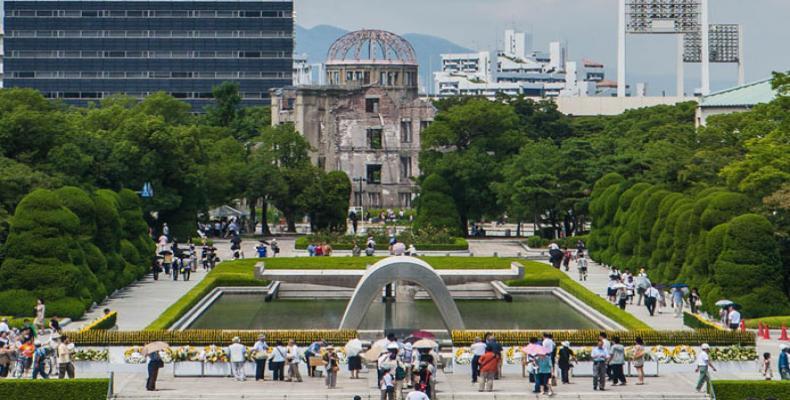This Thursday, precisely at eight fifteen in the morning, local time, an adolescent girl and a school boy from Japan rang the bell at the Hiroshima Peace Memorial, to recall the exact moment when, seventy years ago, a U.S. atomic bomb wiped out that Japanese city and in a matter of seconds killed eighty thousand people, although the final number of victims rose to two hundred thousand due to burns, wounds and the lethal effect of nuclear radiation.
Three days after the Hiroshima nuclear massacre, the mass murder was repeated at the port city of Nagasaki, which turned both bombings into the largest genocide in history, committed within a seventy two hour time lapse.
There are many so-called “justifications” that US politicians, scholars and military investigators have put forward over the past seven decades in an attempt to rationalize why such barbarous attacks were necessary.
The arguments include the calculation that both nuclear holocausts
were needed to save the lives of half a million American soldiers who would have died during an eventual U.S. invasion of Japan.
Another excuse is that the nuclear holocausts were the only way to put an end to the Second World War: also that the Japanese population was warned before the attack and that it was a way to warn the Soviet Union that the U.S. meant business in its quest to be the world’s foremost military power.
All those explanations are no more than pretexts and do not resist a serious historic analysis.
When the nuclear attacks took place, Japan was already tactically and strategically defeated, its oil sources were cut, its ports were blockaded, its main industrial centers and cities had been virtually leveled by day and night aerial bombings and Tokyo’s main ally, Nazi Germany had surrendered three months before.
True enough, some Japanese cities were 'notified' with leaflets warning about a prospective rain of fire, but the true targets were not included.
What many experts overlook is that no warning was advanced to the
people in both cities, chosen at a meeting held in Washington’s War Department on May 31st, 1945.
Although the population of both cities was not warned, the US
officials who chose both targets were very well informed on the
destructive effects of both bombs.
They included President Harry S. Truman and his main advisors, among them Robert Oppenheimer, considered the technical father of the bomb; James Conant, President of Harvard University, and War Secretary Lewis Stimson, who were updated about the destructive capacity of the bombs and their latter effects. Nevertheless, they decided to conduct the nuclear attack on both cities.
This horrendous war crime, a major affront to humanity, is still
unpunished. Adding insult to injury, Japan, after the war, became an ally of the United States. Furthermore, the White House has never apologized to the families of the victims for such horrendous, massive crimes.
In fact, the U.S. became the first nation to use the massive destruction unleashed by atoms against unarmed, unprotected civilians… and it could do it again!
From August 1945 up to today, more than two thousand nuclear devices have been exploded, five hundred of them in the atmosphere, a procedure that has spread radiation over the whole planet, turning billions of innocent people into victims and hostages of this immoral arms race.
A very small group of countries, some of them guilty of
internationally conducting immoral policies, such as Israel, stockpile at least sixteen thousand four hundred nuclear warheads, one fourth of them ready to be used in a matter of minutes.
Cuban hero Fernando Gonzalez was part of the Cuban delegation invited to Hiroshima for the ceremonies remembering the victims of the atomic bomb attack.
He declared at a meeting in that city that it is urgent to begin nuclear disarmament, which should be complete, transparent,
verifiable and irreversible.
This is the only way to prevent another massive crime just as that
carried out seventy years ago, when humanity suffered a massive
attack.
Four hundred years ago, the English poet John Donne said that no
person is an island. The death of any human being –he said— also diminishes all human beings, and that in tolling for the dead, the bells are also tolling for the living.


